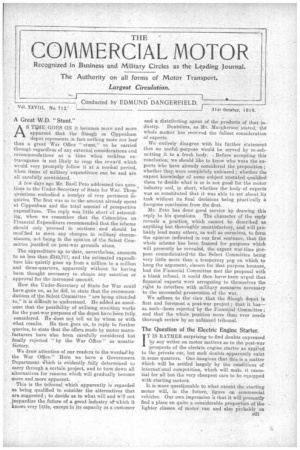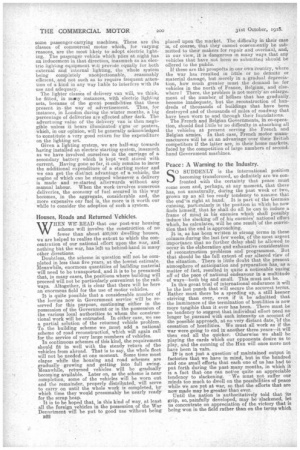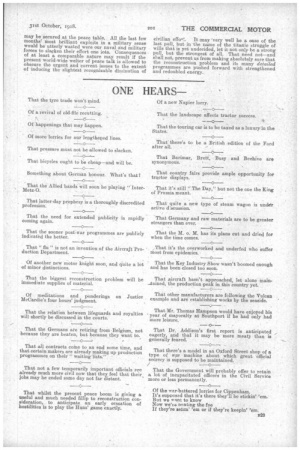A Great W.D. "Stunt."
Page 1

Page 2

Page 3

If you've noticed an error in this article please click here to report it so we can fix it.
AS TIME GOES ON it becomes more and more , apparent that the Slough or Cippenham depot represents in fact nothing more nor less' than a great War Office "stunt," to be carried through regardless of any external considerations and recommendations at a time when reckless extravagance is not likely to reap the rewai'd which wculd very promptly follow it at a normal period, When items of military expenditure can be and are all carefully scrutinized.
A few days ago Mr. Basil Pete addressed two ques-t tions to the Under-Secretary of State for War. These questions embodied a number of very pertinent i; quiries. The first was as to the amount already spent at Cippenham and the total amount of prospective expenditure. The reply was little short of astound ing, when we remember that the Coramittee on Financial Expenditure recommended that the scheme should only 'proceed in sections and should be mod:fled to meet any changes in militarY circumstances, not being in the opinion of the Select Committee justified on post-war grounds alone.
The expenditure up to%date, nevertheless, amounts to no less than t 343,717; and the estimated expendi ture has quietly gone up from a million to a million and three-quarters, apparently without its having been thought necessary to obtain any sanction or approval for the increased amourit.
Bow the Under-Secretary of State for War could have gone on, as be did, to state that the recommen dations of the Select Committee "are being attended to," it is difficult to understand. He added an assurance that the possibility of utilizing munition worlcs for the post-war purposes of the depot have been fully.
'considered. tie-does net tell us by whom or with what results. He then goes on, in reply to further queries, to state that the offers made by motor manufacturers have also been carefully considered but finally rejected "by the War Office " as unsatis factory. . .
We draw attention of our readers to the wordsaltby the War Office." Here we have a Government Department li"rhich is evidently .fully determined to carry through a certain project, and to turn down all alternatives for reasons which will gradually become more and more apparent. , This is the tribunal which apparently is regarded as being qualified to consider the alternatives that are suggested; to decide as to what will and will not jeopardize the future of a great industry of which it knows very little, except in its capacity as a customer and a distributiu,g agent of the products of that industry. Doubtless, as Mr. Macpherson stated, th6 whole matter has received the fullest consideration of experts.
We entirely disagree with his further statement that no useful purpose would be served by re-submitting it to a fresh body. . Before accepting this conclusion, we should like to know who were the experts who have already considered the proposition; whether they. were completely unbiased; whether the expert. knowledge of some subject unstated qualified them to decide what is or is not good for the motor industry and, in short, whether the body of experts was so constituted that it was able to set about its task without its final decisions being practically a foregone conclusion from the first.
Mr. Peto has done good service by drawing this reply to his questions. The character of the reply reveals a position which cannot. be described as anything but thoroughly ,unsatisfactorY, and will probably lead many others, as well as ourselves, to form the opinion indicated in our first sentence, that the whole scheme has been framed for purposes which will presently be revealed, the urgent war-time purpose commdnicatedIto the Select Committee being very little more than a temporary peg on which to hang the argument, chosen for that purpose because, had the Financial Committee met the proposal with a blank refusal, it could then have been urged that financial experts were arrogating to themselves the .. right to interfere with military measures necessary to the successful prosecution of the war.
We adhere to the view that the Slough depot is first and foremost a post-war project; that it has— as such—been rejected by the Financial Committee; and that the whole position more than ever needs thorough review by an unbiased tribunal..
The Question of the Electric Engine Starter.
IT IS RATHER surprising to find doubts expressed by any writer on motor matters as to the post-war prospects of the electric engine starter as applied to the private car, but such doubts apparently exist in some quarters. One imagines that this is a.matter Which will be settled largely by the conditions of international competition, which will maim at essential for all but the very cheapest cars to be equipped with starting motors.
It is more questionable to what extent. the starting motor will, in the future, figure on commercial vehicles. Our own impression Ts that it will presently find a place on quite a considerable proportion of the , lighter classes of motor van and also Probably on some passenger-carrying machines. These are the, classes of commercial motor which, for varying reasons, are the most likely to adopt electric hght ing. The passenger vehicle whieh plies at night has an. inducement in that direction, inasmuch as an electrio lighting equipment will provide equally for both external and internal lighting, the whole system being completely unobjectionable, reasonably efficient, and not such as to require frequent attention of a kind in any way liable to interfere with its use and adequacy...
The lighter classes of delivery van will, we think, be fitted, in maw instances, with electriclighting sets, because of the great possibilities that these present in the way of advertisement. Thus, for instance, in London during the winter months, a big percentage of deliveries are effected after dark. The advertising value of the delivery van is then negligible unless it bears illuminated sgns or posters, which, in our opinion, will be generally acknowledged to iconstitute a very good return for the expenditure on the lighting set.
Given a lighting system, we a-re half-way towards having installed an electric starting system, inasmuch as we have involved ourselves in the carriage of a secondary battery which is kept 'well stored with current. Having gone so far, it only remains to incur the additional expenditure of a starting motor and we can get the distinct advantage of a vehicle, the engine of which can be stopped whenever a delivery is made and re-started afterwards without any manual labour. When the work !involves numerous deliveries, the economy of fuel secured in this way becomes, in the aggregate, considerable and, the more expensive our fuel is, the more is it worth our while to consider the adoption of such a system.
Houses, Roads and Returned Vehicles.
WHEN WE' READ that or post-war housing scheme will involve the construction of no fewer than about 40171,000 dwellinghouses, we are helped to realize the extent to which the concentration of our national effort upon the war, and nothing but the war, has left us behind-hand in many
other directions. . Doubtless, the scheme in question will not be completed in less than five years, at the lowest estimate. Meanwhile enormous quantities of building material will need Meanwhile, be transported, and it is to be presumed that, in many cases, the positions where building will proceed will not be particularly convenient to the railways. Altogether, it is clear that there will be here an enormous field for the use of motor vehicles.
It is quite possible that a considerable number of 'the lorries now in Government service will be reserved for this purpose, continuing either in the possession of the Government or in the possession of the various local authorities to whom the constructional work will be entrusted. In either case, we see a partial solution of the returned vehicle problem. To the building scheme we must add a national scheme of road reconstructia, which will again call for the service of very large numbers of vehicles. In continuous schemes of this kind, the requirement should fat in well with the steady return of the vehicles from abroad. That is to say, the whole fleet will not be needed at one moment. Some time must elapse while the housing and road schemes are gradually growing and getting into full swing. Meanwhile, returned vehicles will be gradually becouaing available. Later on, as the scheme is near completion, some of the vehicles will be worn out and the remainder, properly distributed, will serve to carry on until the whole work is completed, by which time they would presumably be nearly ready for the scrap heap. It is to be hoped that. in this kind of way. at least all the foreign vehicles in the possession of the War Denartment will be put to good use without being B22 placed upon the market. The difficulty in their case is, of course, that they cannot coreveniently be submitted to their makers for repair and overhaul, and, in our view, it is dangerous in many ways that any vehicles that have not been so submitted should be offered to the public. If these are the prospeas in our own 'Country, where the war has resulted in little or no definite or material damage, but merely in a gradual depreciation, how much greater must the demand be for vehicles in the north of France, Belgium, and elsewhere? There, the problem is not merely' anenlargement of the number of hotises that has gradually_ become inadequate, but the reconstruction of hundreds of thousands of buildings that have been destroyed and of thousands of miles of roadway that have been Worn to and through their foundations. The French and Belgian Governments, in co-operation, should find little br no difficulty in absorbing all the vehicles at present serving the French and Belgian armies. In that case, French motor manumacturers will be at an advantage over their British competitors if the latter are, in their home markets, faced by the competition of large numbers of secondhand Government machines.
Peace : A Warning to the Industry.
SO 0 SUDDENLY is the international position becoming transformed, so definitely are we confronted with the certainty, that peace must come soon and, perhaps, at any moment, that there has, not unnaturally, during the past week or two, grown up an all too ready tendency to assume that the enaris right at hand. It is part of the German cunning, particularly in the position in which he now finds himself, that he shall do all he can to induce a frame of mind in his enemies which shall possibly induce the slacking off of his enemies' national effort which, he calculates, will be one result 'of the conviction that the end is approaching.
It is, as has been written in strong terms in these columns during the last few weeks, of the most urgent importance that no further delay shall be allowed to occur in the elaboration and exhaustive consideration of reconstruction problems and programmes. But that should be the full extent of our altered view of the situation. There is little doubt that the present atmosphere of anticipation and preparation has, as a matter of fact, resulted in quite a noticeable easing off of the pace of national endeavour in a multitude of ways—both big and small. This must not be.
In this great trial of international endurance it will be the last punch that will secure the securest terms. Rather must there be a speeding up, a still keener striving than ever, even if it be admitted that the imminence of the termination of hostilities is now more tangible than it ever has been. There must be no tendency to suggest that individual effort need no longer be. pursued with such intensity on account of the possible approach, at no very distant date,--of the cessation of hostilities. We must all work as if the war were going to end in another three years—it will then end all the quicker. Otherwise we shall be playing the cards which our opponents desire us to play, and the cunning of the Hun will once more not have been in vain.
It is not just a question of maintained output in factories that we have in mind, but in the hundred and one small efforts that each one of us has had to put forth during the past many months, in which it is a fact that one can notice quite an appreciable tendency to slackening. We must not suffer our minds too much to dwell on the possibilities of peace while we are yet at war, so that the efforts that are now made may be greater than ever. Until the nation is authoritatively told that its grip, so. painfully developed, may be slackened, let us concentrate on appreciation of the victory that is being won in the field rather than on the terms which
may be secured at the peace table. All the last few months' most brilliant exploits in a military sense would be utterly wasted were our naval and military forces to slacken their effort one iota. Consequences of at least a comparable nature may result if the present world-wide welter of peace talk is allowed to obscure the urgent and current issues to the extent of inducing the slightest recognizable diminution of civilian effo-t. It 'nay -very well be a case of the last pull, but in the name of the titanic struggle of wills that is yet undecided, let it not only be a strong pull, but the strongest of all. That need not—and shall not, prevent us from making absolutely sure that the reconstruction problem and its many detailed programmes are pushed forward with strengthened and redoubled energy.






















